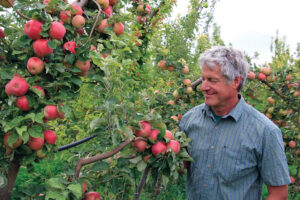The Senate Committee on Agriculture, Nutrition, and Forestry held a hearing on the “Farm Bill 2023: Research Programs” on December 6th. The only farmer testifying was Steve Ela, a fourth-generation farmer who has been farming organically for nearly thirty years at Ela Family Farms, his family’s farm in Hotchkiss, Colorado. As well as his farming experience, Ela also served on the National Organic Standards Board as Board Chair, as well as the Organic Farming Research Foundation (OFRF) Board as Board President. As one of five panelists invited to share their expertise, Ela spoke to the importance of organic systems research and extension programs to all farmers.
“It is significant that an organic producer was invited to testify and share their experiences with research and extension programs before the Senate Committee that writes the Farm Bill. Steve made a compelling case for the need for more public investment in organic agricultural research,” said Brise Tencer, Executive Director of OFRF. She continued, “Steve has had the experience of both a participant and a consumer of organic research, and it is crucial that we hear more from farmers like him that depend on these research programs.”
To begin the hearing, Research, Education, and Economics (REE) Undersecretary for the USDA Dr. Chavonda Jacobs-Young provided a general overview of REE programs and stressed the importance of meaningful investment into these programs. Dr. Jacobs-Young provided three main calls to action for the Committee: 1) increase investment into public research programs; 2) invest in the revitalization of our nation’s agriculture research infrastructure; and 3) expand the tracks of research available to young and beginning researchers from diverse backgrounds.

Former OFRF Board President, Steve Ela of Ela Family Farms in the apple orchard
In his testimony, Ela highlighted how USDA funded organic research programs help all farmers, not just those certified organic, giving examples such as codling moth management through pheromone disruption, or the use of cover crops for pest and weed control. Ela also discussed how complex organic agricultural management can be, and why that’s so important to both its resilience and the importance of organic research: “The longer I farm, the more I realize how complex the ecosystem is that I am working with. It is imperative that rather than heavily investing into basic, single issue agricultural research, like specific chemicals or gene transfers, we embrace systems management and action-oriented research that not only enhances our understanding of complex ecosystems but helps farmers work with rather than against natural systems.”
To make sure that this type of research is continued to be supported, and expanded, at the USDA, Ela’s testimony called on Congress to:
- Increase funding for the Organic Agriculture Research and Extension Initiative (OREI) to $100 million by end of the 2023 Farm Bill;
- Formally authorize the existing NIFA Organic Transition Program at $20 million by the end of the 2023 Farm Bill, with a name change and program mission updates to avoid confusion and improve program operation;
- Continue to support the work of other NIFA programs that should expand their organic portfolio, like SARE, SCRI, and AFRI-SAS;
- Require USDA to direct ARS to increase investments into organic agriculture research, both through coordinating the ongoing and planned research while also increasing the amount of organically certified acreage ARS is operating;
- Reauthorize the Organic Data Initiative (ODI) to expand segregated organic data collection and analysis by the National Agricultural Statistics Service, Agricultural Marketing Service, and the Economic Research Service and require an economic impact analysis of the organic agriculture market on rural communities;
- Require USDA to dedicate funds annually to fund the development of cultivars and animal breeds that are regionally adapted using conventional breeding methods to address farmers’ unique soils, farming systems, market needs, and changing climates; and
- Require USDA to appoint a Public Cultivar and Breed Research Coordinator reporting to the Under Secretary of Research, Education, and Economics to oversee collaboration between existing USDA competitive grant research programs regarding regionally adapted cultivar and breed development activities.
This list of policies align with OFRF’s priorities this 2023 Farm Bill season, and we believe represent an increasingly-rare opportunity for bipartisan legislation. Investing in public agricultural research has historically enjoyed broad support in the Farm Bill. Not only does this research answer the questions farmers need answers to, but it also has a significant economic payoff of $20 for every dollar spent.
“We at OFRF are looking forward to working with a diverse, bipartisan group of legislators this Farm Bill cycle to make sure farmers like Steve have access to the research and technical expertise necessary to be a successful agricultural business managing their land organically,” said Gordon Merrick, Policy & Programs Manager at OFRF.
OFRF supports actionable research that focuses on the wide adoption of organic systems of production and the climate resiliency services it offers. OFRF has led organic farming and research initiatives since its inception in 1993 and has advocated for federal policy supporting integrated research, education, and outreach to farmers who build healthy resilient farming systems that withstand climate change and steward the land for future generations.
###
About Organic Farming Research Foundation
Organic Farming Research Foundation works to foster the improvement and widespread adoption of organic farming systems. OFRF cultivates organic research, education, and federal policies that bring more farmers and acreage into organic production. http://www.ofrf.org/
Policy Contact
Gordon N. Merrick, Policy & Programs Manager, gordon@ofrf.org


